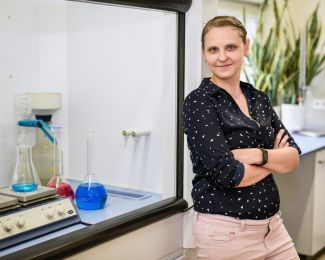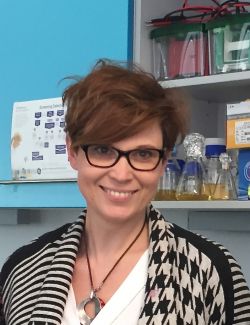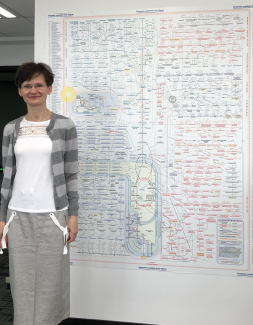Assoc. Prof. Eng. Marta Gmurek, professor at the Faculty of Process Engineering and Environmental Protection, is going to receive over 1 million PLN from the Sonata programme for Research on the synergy between ozone and plasma-generated new catalysts in the hybrid process of micropollutant ozonation. The researcher herself explains:
We have recently observed an increase in the amount of different water pollutants, e.g. pharmaceuticals, personal care products, pesticides and endocrine-disrupting chemicals (EDCs). They are more and more often detected, in concentrations much higher than has been anticipated, and there is a concern that they may have a negative impact on aquatic organisms and people. It is known that water recycling is gaining more and more importance for industry and, therefore, adequate sewage treatment at an acceptable quality level is becoming indispensable. The main objective of the project is to examine the role of the synergistic effect between molecularly designed, cold plasma-generated, thin-layer electrocatalytic systems and ozone, in the hybrid process of electrochemical ozonation. The process is essentially designed to find highly stable and electrically active electrodes that will intensify the degradation process thanks to the combined ozone action.
More information on research carried out by Assoc. Prof. Eng. Marta Gmurek is available in the interview.
Preludium BIS 2 will be the source of over 1 million PLN subsidy in total as well, to carry out two projects. The first one, Targeted degradation of Rab geranylgeranyltransferase as a new approach to study GTPaz Rab prenylation, will be conducted by Assoc. Professor Edyta Violetta Gendaszewska-Darmach, professor at the Faculty of Biotechnology and Food Sciences, Lodz University of Technology. She has received 541,600 PLN from the Polish National Centre for Research and Development for the purpose. She is going to conduct her project in cooperation with Professor Jacques Neefjes from the Leiden University Medical Centre in the Netherlands. Prof. Gendaszewska-Darmach explains the difficult subject of her research in the following words:
Prenylation is a type of protein modification that controls protein activity in cells. One of the enzymes which catalyze the prenylation process is Rab geranylgeranyltransferase (RGGT) that selectively modifies proteins from the Rab family. It has been found that defects in the prenylation process may lead to the development of many diseases, e.g. cancers or neurological conditions. One of the ways to constrain the negative impact of Rab proteins is the inhibition of the enzymatic activity of RGGT.
The main objective of the project is to develop an innovative strategy for targeting RGGT to degradation using low-molecule chemical compounds, the so-called PROTAC (PROteolysis TArgeting Chimera) based on RGGT inhibitors, developed by the research group led by Assoc. Prof. Katarzyna Błażewska from the Faculty of Chemistry at Lodz University of Technology. Biological validation of the hypothesis will be carried out by my research group, using a number of biological models. The development of an experimental model which will allow us to monitor targeted proteolysis of the RGGT enzyme and its protein partners using the CRISPR/Cas9 technology will be possible thanks to our cooperation with Prof. Jacques Neefies.
Prof. Gendaszewska-Darmach has carried out projects financed by the Polish National Centre for Research and Development before.
The other project financed from Preludium BIS 2 – Using the PROTAC strategy to control the enzyme of Rab geranylgeranyltransferase and Rab protein transferase will be carried out by Assoc. Prof. Katarzyna Błażewska, professor at the Faculty of Chemistry of Lodz University of Technology. She has also been allocated 541,400 PLN for her research. She is going to conduct it in collaboration with Prof. Mark Distefano from the University of Minnesota, USA. Professor Błażewska explains:
The main objective of our research is to develop an innovative strategy targeted at the degradation of the Rab geranylgeranyltransferase enzyme, using the PROTAC strategy. Low-molecule PROTAC compounds will originate from our previously developed RGGT inhibitors whose impact will be reinforced by adding a molecule targeting the proteasome. As part of the project, apart from designing and synthesizing the new compounds, we are going to carry out proteomic studies that will allow us to verify the other research hypothesis, namely: whether PROTAC molecules targeted to RGGT will also have the ability to degrade Rab proteins that form a complex with RGGT.
The anticipated outcome of the project is the development of a new concept of utilizing the PROTAC strategy by expanding its range of use to a new class of enzymes and applying the obtained PROTAC molecules as instruments to examine RGGT and Rab proteins, as well as the relationships between them. In the future, PROTAC molecules may be used for therapeutic purposes to deal with diseases connected with disrupted prenylation, i.e. protein modification.



